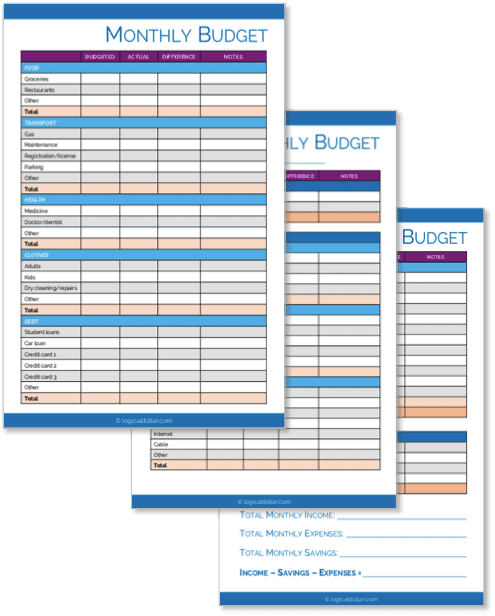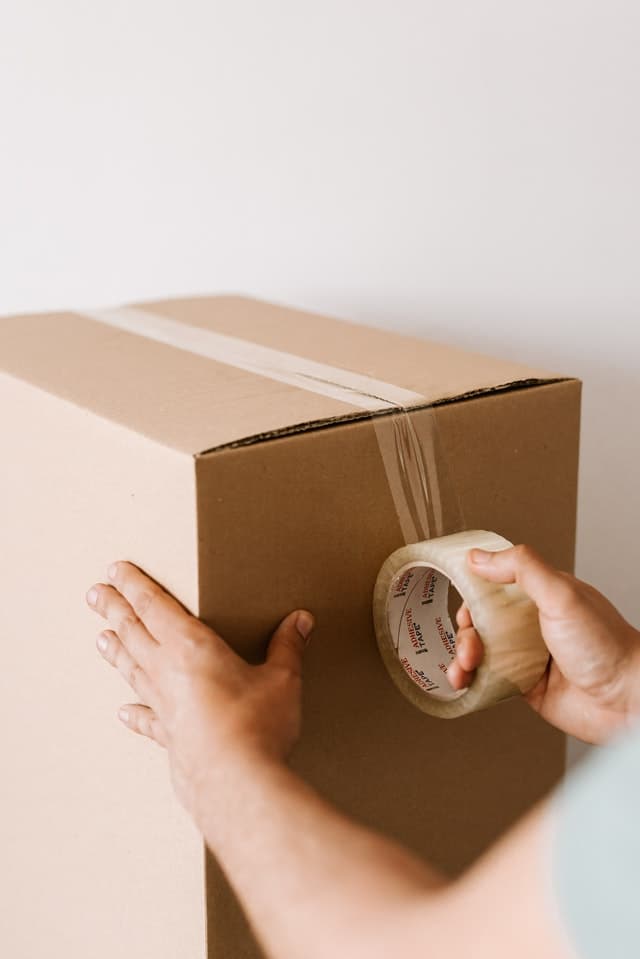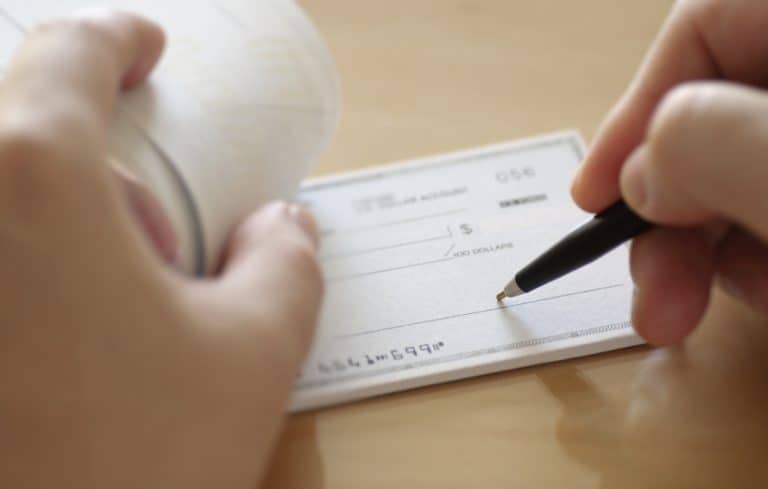Thinking about moving out somewhere can definitely be an exciting time, especially if it’s your first time moving out of home! At the same time, there’s no doubt that there are various expenses when renting that you need to consider to make sure your budget can stretch that far..
In fact, according to Census.gov, the average median cost of renting in the US is $1,097 per month. As the rental market continues to skyrocket in the US, preparing for potential rental expenses prior to moving out is a must.
Preparing finances and planning for future rental expenses, like your expected bills when renting, will not only help to alleviate potential financial stress, but will also provide peace of mind.

TAKE BACK CONTROL OF YOUR FINANCES
Our free budget planner will help you to quickly and easily take control of your money – instead of it controlling you.
Get it free for a limited time!
You’ll also join our mailing list to get updates on how to manage your money – unsubscribe at any time at the end of each email.
Expenses when renting
When planning for a move, it’s important to consider what expenses are likely to arise, even before finalizing the actual move itself.
While some rental expenses are greater than others, they quickly add up if forgotten. Luckily, you can easily avoid that situation by using this home and apartment expenses list, ensuring that you are fully prepared for your upcoming moving date.
1. Application fee
When you are interested in renting a property, whether it is an apartment or a house, you may be required to pay an application fee. An application fee will provide the funds necessary for a landlord to complete a background check and/or credit check, depending on what is required for the individual property you are interested in.
The application fee is a one-time fee. Typically, an application fee will run anywhere from $30 to $100 per applicant who intends to be a tenant in the home or apartment.
2. Security deposit
With any rental lease, a security deposit is typically required. The security deposit required will often cost the same or less than one month’s rent at your desired rental location.

In some cases, a security deposit is used to hold a rental for a prospective tenant, especially if there is an extensive waiting list. A security deposit is returned to you as the renter once your leasing agreement is up and you have decided to move out, so long as you have abided by your rental agreement.
3. Pet deposit
If you are moving to an apartment building with your four-legged family members, one of the expenses when renting an apartment you may be required to cover is a pet deposit. Some landlords who rent homes to tenants may also require a pet deposit depending on the type of animal(s) you own as well as the number of animals you intend to house.
With many apartments that allow pets, prospective tenants are required to pay upwards of $100-$200 per pet to cover their deposit. A pet deposit covers potential damage to carpet, walls, and other areas of a rental that a landlord may need to repair once you have moved out. In addition to a pet deposit, you may also be required to pay a monthly fee for each pet you own, ranging from $5-$25 per pet.
4. First and last month’s rent
Planning a move to an apartment will likely require you to not only pay a security deposit upfront, but also your first month’s rent before moving in. Saving ahead of time will help to ease the strain of these major upfront costs of renting, especially when moving into a stricter apartment complex or rental property.
For some home rentals, both first and last month’s rent may also be requested by your new landlord. The first and last month’s rent along with traditional deposits are some of the most common expenses that come with renting a house. Paying both your first and last month’s rent ensures your new landlord that you are serious, committed, and capable of paying your rent.
Related: I Need to Move Out But Can’t Afford It! What Should I Do?
5. Storage rentals
Another cost of renting to consider, especially while calculating expenses while renting an apartment, is storage costs. If you intend to move to an apartment that does not provide enough space or storage for your belongings, you may need to consider renting an additional storage unit.

Storage units are available in a variety of sizes and are located both indoors and out. To rent a storage unit, you will likely need anywhere from $50 to more than $150 per month, depending on the size of the unit you require to hold your additional furnishings and personal belongings.
6. Moving costs
Calculate moving costs that you will need to cover on the day of your move. Not only will you need transportation, such as a moving truck, but you may need to request the assistance of friends. If you are unable to enlist the help of friends for your move, call local moving companies in your area to inquire about estimates and total costs.
You will also need to plan for moving supplies, such as boxes, packaging peanuts, bubble wrap, tape, and labels or markers.
FYI: To save on expenses on moving supplies, ask local gas stations and shops in your local neighborhood for old boxes that they are throwing out or no longer need. You can also check out sites like Craigslist or Facebook Marketplace, where people often give away or sell at a massively reduced price their own moving supplies that they no longer need.
7. Furnishings and appliances
When moving to a new rental property, consider the furnishings and appliances you may need. While most apartments will provide standard appliances such as a refrigerator and stove, you may need to provide your own microwave and additional appliances you prefer.
If you are interested in renting a home, you may be required to provide standard appliances in addition to appliances such as washers and dryers. Always clarify with prospective landlords what appliances are included with your rental costs.
Not only is it important to understand the average costs of renting where you intend to move to, but it is also necessary to know what expenses you are likely to incur throughout the moving process itself. The more financially prepared you are for an upcoming move, the less likely you are to encounter major issues along the way.
8. Amenities
Moving to an apartment complex that is all-inclusive or that comes with a variety of amenities may cost more ultimately. Amenities such as a fitness center, a swimming pool, or even on-call 24/7 maintenance can all cause your rent cost to rise.

If you are interested in amenities for your apartment or rental property, be sure to verify the costs of the services you intend to seek out prior to signing a leasing agreement. Most amenities of apartment complexes are included with the total rent costs that are due each month.
9. Renter’s insurance
Another cost to consider before moving into a rental is renter’s insurance. Renter’s insurance protects your belongings such as your furniture as well as any valuables you have on your property in the event of a fire, accident, or another disaster.
Renter’s insurance is optional in most rental locations, but it may be required for long-term contracts or for larger corporate apartment and housing rental services. Oftentimes, renter’s insurance is extremely affordable, and will run anywhere from $10 to no more than $35 per month, depending on the amount of insurance you need.
10. Parking
Parking is one of the most important aspects of moving to keep in mind before settling on a destination and desired rental property. If you are moving to an apartment complex, consider whether you will need a special parking space, a covered parking spot, or even a garage. Not all apartment complexes will provide tenants with designated spaces, which is why it is highly advisable to inquire about your options ahead of time to avoid an unexpected additional expense when renting.

If you are moving to a larger city, you may also be required to pay for garage parking if there is no parking directly outside of your apartment or rental property. Research average garage parking costs per month in your desired area. In many locations, garages charge anywhere from $75 to upwards of $150, depending on surrounding demand.
For specific parking spaces in apartment complexes, expect to pay anywhere from $15 to more than $50 a month.
11. Pest control
Depending on where you choose to rent, you may consider pest control services if they are offered or provided by your preferred apartment complex or rental company. Not all home landlords offer pest control services, but it does not hurt to ask, especially if you are moving to an area that is known for bugs and other unwanted critters.
On average, pest control services that are provided by apartment complexes will only run you anywhere from $10 to $15 monthly, and may be included in or tacked onto your rent. And if you’re not planning to go into an apartment, this may be one of the expenses that come with renting a house that’s higher than an apartment, given pest control will also have to spray your yard and other parts of the building as well.
12. Trash
In some apartment complexes, tenants are required to pay a monthly fee to cover trash collection or a trash valet service. Trash collection services often require you to carry your trash to a specific dropoff point or to a nearby dumpster. Trash valet services, however, may include trash pickup and placement outside of your door.
For traditional trash collection services in standard apartments, fees often range anywhere from $5 to $15 a month. For a trash valet service, expect to pay anywhere from $25 to $50 monthly.

MANAGE YOUR MONEY LIKE A BOSS
Managing your money effectively can literally change your life. And starting a budget using our budget planner is the first step towards you doing just that.
Get it free for a limited time!
You’ll also join our mailing list to get updates on how to manage your money – unsubscribe at any time at the end of each email.
Are bills included in rent?
With some apartments as well as homes, various bills may be included in the rent. Before signing a lease, it is imperative to review your leasing agreement to determine which expenses are included with your rental costs.
One of the most appealing advantages of renting is that some utilities and/or bills are included with the cost of the rent. Cable services, internet services, and even water and trash may all be included with your rental costs. This can at least make it seem that your expenses when renting an apartment appear to be less than they would otherwise be.
Some apartment complexes offer all-inclusive rentals. An all-inclusive rental not only covers the cost of renting, but often additional utilities such as water and trash collection. For a bit more in price and to avoid having to keep track of bills yourself, you can also seek out rental property companies that also include cable television, internet, and electricity in your monthly rent.

What bills do you pay when renting an apartment?
When paying for an apartment, you will be required to pay your rent along with any required fees or monthly utilities you use. If water and trash are not included in your leasing agreement, you will be required to pay them separately from your rent.
Rental bills will vary from location and type of property, which is why it is important to conduct research prior to moving into a new area or neighborhood that is unfamiliar to you. In some areas, the cost of water may be significantly more costly than in others. Spend time researching the average cost of utilities such as electricity, water, gas, and even trash to find the best possible rate.
Additionally, you will also be required to pay for electric and/or gas, cable, internet, and any other services you use. If you are looking for a rental property that covers the cost of various utilities and/or amenities you are interested in, it is best to seek out an all-inclusive rental to help with condensing and lowering your bills when renting.
Are you planning to move out with a partner? It’s a good idea to discuss financial issues with a partner before moving out with them, especially if there is a money imbalance in your relationship – that is, where one person earns more than the other. Agreeing upfront how you’ll split expenses can save you a lot of trouble down the road.
Who pays for the water in a rental property?
With a rental property, water may be covered by the landlord or by the tenant. In many cases, with a rental apartment, water is covered by the landlord or the apartment complex itself. When renting a home, a landlord may require that all tenants cover their own water bills, especially in single-family homes.
In some larger and more expansive apartment complexes, there may be a community water bill. A community water bill takes the average cost of each tenant in an apartment building to determine the monthly cost of water for the building itself. Community water solutions can help with saving money, as long as there is not an excessive usage of water at the location you choose to move into.

What costs are landlords responsible for?
Making the decision to rent is not always an easy or straightforward one. However, it is important to understand just what landlords are responsible for when it comes to owning and renting properties of their own. Some of the costs landlords are responsible for include:
- Mortgage – All landlords are responsible for a monthly mortgage payment on their investment properties unless they own them outright already and have paid them off entirely. Much of the rental payment a landlord receives from a tenant each month goes directly toward paying the interest and principal of loans taken out in order to obtain the property.
- Codes and compliance – Staying up to code is an essential part of being a landlord, whether the landlord owns an apartment building or a single-family residence. Whenever codes are updated for landlords, they are required to make the necessary updates, repairs, and replacements. If a rewiring job is required by law, a landlord must immediately address and complete the tasks in all of the rental properties he or she owns.
- Taxes – As a landlord, paying property taxes in the spring as well as in the winter is necessary each year. In addition to traditional property taxes, landlords are also responsible for paying taxes on each of the rental properties they rent out and the income they receive from tenants.
- Bookkeeping – Managing rental income, taxes for each rental property, and expenses on renting properties as a landlord can quickly become complicated and feel overwhelming, especially if you are unfamiliar with the industry. Hiring a bookkeeping service is one way for landlords to ensure their accounts are handled properly and efficiently without falling behind financially. A landlord can expect to pay at least a few thousand dollars each year to cover the cost of an accountant and/or bookkeeper that specializes in rental properties.
- Property management fees – If the owner of a rental property does not manage the property directly and on their own, they will need to hire a third-party property management service. Property management services typically require anywhere from 8% to more than 12% of the rental income in order to provide day-to-day property management services for active tenants and even home residents.
- HOA Fees – If a landlord owns properties that are located in an area with an active HOA, they are still responsible for the monthly HOA fees on the home or property itself.
- Maintenance – One of the benefits of renting is that you are not responsible for repairs or for replacing major appliances should they break or stop working due to age. A major cost sink for any landlord often involves traditional maintenance jobs and repairs. On average, landlords should put anywhere from 5% to 20% of their total income aside for ongoing maintenance and future repairs.
- Marketing costs – If a landlord or property manager is interested in expanding their reach, both online and off, they will need to consider marketing costs that they will incur. The cost of marketing properties and vacancies can range from $100 to a few thousand dollars each year, depending on the demand in the location of a rental property.
- Turnovers – When a tenant stops paying their rent, refuses to move out, or simply leaves the premises, a landlord must cover and make up the lost income. Turnover costs can quickly add up, especially if a landlord is having trouble finding a tenant that is suitable and qualified for their property.
- Legal fees – Unfortunately, a landlord is also responsible for paying their own legal fees when faced with a conflict with a current or past tenant. Filing an eviction notice for a tenant costs a few hundred dollars, and can cost upwards of $500 to complete the process, even before recouping any lost rent (when possible). Additionally, legal fees may also be required whenever there is a conflict or dispute between a tenant and landlord.
How much money should you have saved before renting an apartment?
When saving for an apartment to rent, it is important to calculate the average rental costs in your area and desired neighborhood(s). Begin by saving your first and last month’s rent, an estimated security deposit, as well as application fees and moving costs you are likely to incur.
The exact amount of each of these is going to depend on a number of factors, like the average cost of rent you’re expecting to pay and how much stuff you have (to get a rough estimate of moving costs). As always when saving up money for something as part of your personal financial plan, it’s usually good to err on the side of caution by saving more than you’ll think you need.
That way, if there are any unexpected costs of renting that appear, you’ll have the money on hand to comfortably cover them.

READY FOR MORE?
Join thousands of subscribers in getting regular tips in your inbox on how to take control of your finances and save more money – and, for a limited time, get our free budget planner as a gift!
You’ll also join our mailing list to get updates on how to manage your money – unsubscribe at any time at the end of each email.





